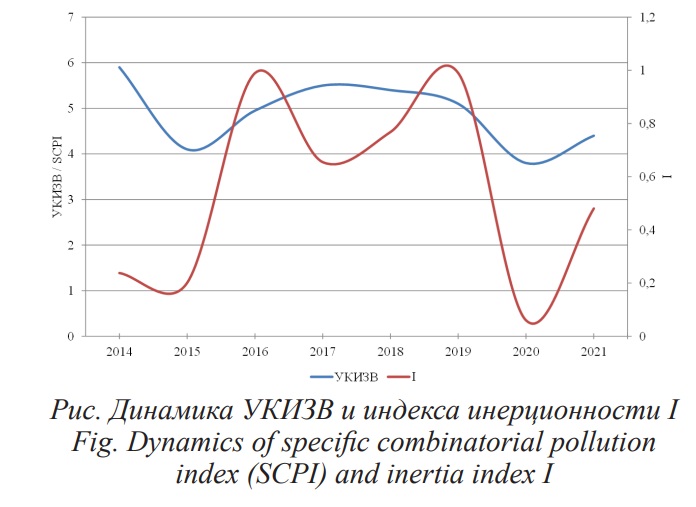Approaches to calculations of inertia in a river hydrochemical regime
DOI:
https://doi.org/10.24852/2411-7374.2024.1.45.49Keywords:
ecological-hydrological systems, water quality, pollution, sustainability, inertia indexAbstract
Assessing the inertia of the ecological-hydrological system is extremely important for the effective management of the water management complex of the basin and for predicting the environmental situation as a whole as well. It was shown that the time and amplitude of system parameters variation depended as on the intensity of the impact and on the rate of occurrence of the reactions that provided variability as well. For the estimation of inertia in ecological and hydrological systems, it was optimal to use a pool of hydrochemical indicators. In the case of calculating the variation of the specific combinatorial pollution index, an algorithm for assessing the inertia of the ecological-hydrological system of the river basin was demonstrated
References
Musaev A.A. Statisticheskij analiz inercionnosti haoticheskih processov [Statistical analysis of the inertia of chaotic processes] // Proceedings of SPII RAS. 2014. Vol. 2. P. 48–59.
RD 52.24.643–2002. Metodicheskie ukazaniya. Metod kompleksnoj ocenki stepeni zagryaznennosti poverhnostnyh vod po gidrohimicheskim pokazatelyam [Methodical instructions. Method for a comprehensive assessment of the degree of pollution of surface waters based on hydrochemical indicators].
Chernov A.V. Metody linearizacii i modeli kontroliruemyh nelinejnyh diskretnyh dinamicheskih sistem [Linearization methods and models of controlled nonlinear discrete dynamic systems] // Nauchno-tekhnicheskie vedomosti Sankt-Peterburgskogo gosudarstvennogo politekhnicheskogo universiteta [Scientific and technical journal of the St. Petersburg state polytechnic university]. 2009. No 2. P. 156–162.
Bosse T., Treur J., Jonker C.M. Formal analysis of design process dynamics // AI EDAM. 2010. Vol. 24, No 3. Р. 397–423.
Delgado M., Ratikainen I.I, Kokko H. Inertia: the discrepancy between individual and common good in dispersal and prospecting behaviour // Biological reviews of the Cambridge philosophical society. 2011. Vol. 86, iss. 3. Р. 717–732. doi: 10.1111/j.1469-185X.2010.00167.x.
Guerra K., Haro P., Gutiérrez R.E., Gómez-Barea A. Data for the modelling of the future power system with a high share of variable renewable energy // Data brief. 2022. Vol. 42. 108095. doi: 10.1016/j.dib.2022.108095.
Guiver C., Dreiwi H., Filannino D.-M., Hodgson D., Lloyd S., Townley S. The role of population inertia in predicting the outcome of stage-structured biological invasions // Mathematical biosciences. 2015. Vol. 265. Р. 1–11. doi: 10.1016/j.mbs.2015.04.005.
Khalighi M., Sommeria-Klein G., Gonze D., Faust K., Lahti L. Quantifying the impact of ecological memory on the dynamics of interacting communities // PLoS. Computational biology. 2022. Vol. 18, iss. 6. e1009396. doi: 10.1371/journal.pcbi.1009396.
Koons D.N., Holmes R.R, Grand J.B. Population inertia and its sensitivity to changes in vital rates and population structure // Ecology. 2007. Vol. 88, iss. 11. Р. 2857–2867. doi: 10.1890/06-1801.1.
Lopez-Miranda J., Marin C. Dietary, physiological, and genetic impacts on postprandial lipid metabolism // British journal of nutrition. 2007. Vol. 98, iss. 3. P. 458–473. doi: 10.1017/S000711450774268X.
Ponzini G.T., Steinman S.A. Mnemonic discrimination and social anxiety: the role of state anxiety // Cognition and emotion. 2020. Vol. 34, iss. 8. Р. 1549–1560. doi: 10.1080/02699931.2020.1779039

Downloads
Published
How to Cite
Issue
Section
License

This work is licensed under a Creative Commons Attribution-NonCommercial 4.0 International License.




